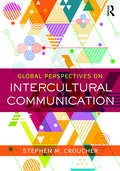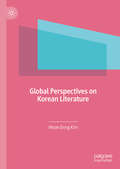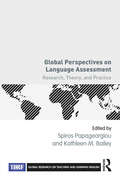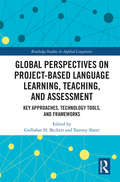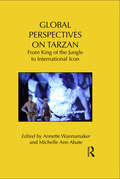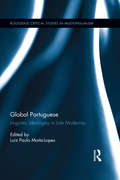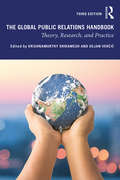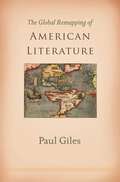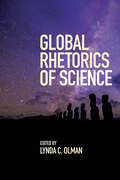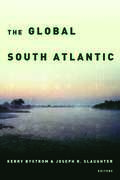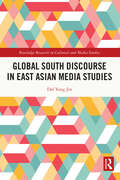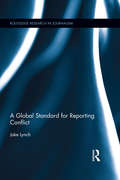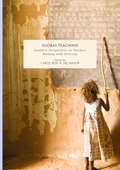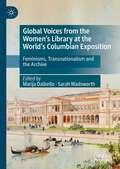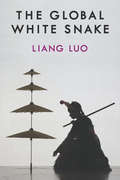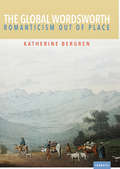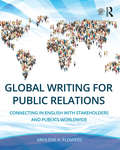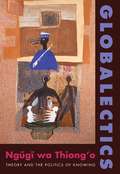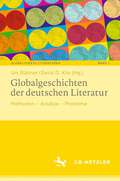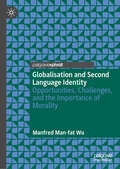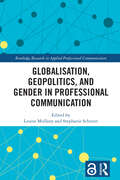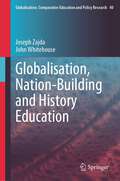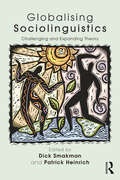- Table View
- List View
Global Perspectives on Intercultural Communication
by Stephen M. CroucherWhat is intercultural communication? How does perspective shape a person’s definition of the key tenets of the term and the field? These are the core questions explored by this accessible global introduction to intercultural communication. Each chapter explores the topic from a different geographic, religious, theoretical, and/or methodological perspective, with an emphasis on non-Western approaches, including Buddhist, South American, Muslim, and Chinese perspectives. Featuring the voices of a range of international contributors, this new textbook presents the full breadth of diverse approaches to intercultural communication and showcases the economic, political, and cultural/societal needs for and benefits of communicative competence.
Global Perspectives on Korean Literature
by Wook-Dong KimThis book explores Korean literature from a broadly global perspective from the mid-9th century to the present, with special emphasis on how it has been influenced by, as well as it has influenced, literatures of other nations. Beginning with the Korean version of the King Midas and his ass’s ears tale in the Silla dynasty, it moves on to discuss Ewa, what might be called the first missionary novel about Korea written by a Western missionary W. Arthur Noble. The book also considers the extent to which in writing fiction and essays Jack London gained grist for his writing from his experience in Korea as a Russo-Japanese War correspondent. In addition, the book explores how modern Korean poetry, fiction, and drama, despite differences in time and space, have actively engaged with Western counterparts. Based on World Literature, which has gained slow but prominent popularity all over the world, this book argues that Korean literature deserves to be part of the Commonwealth of Letters.
Global Perspectives on Language Assessment: Research, Theory, and Practice (Global Research on Teaching and Learning English)
by Spiros Papageorgiou Kathleen M. BaileyThe sixth volume in the Global Research on Teaching and Learning English series offers up-to-date research on the rapidly changing field of language assessment. The book features original research with chapters reporting on a variety of international education settings from a range of diverse perspectives. Covering a broad range of key topics—including scoring processes, test development, and student and teacher perspectives—contributors offer a comprehensive overview of the landscape of language assessment and discuss the consequences and impact for learners, teachers, learning programs, and society. Focusing on the assessment of language proficiency, this volume provides an original compendium of cutting-edge research that will benefit TESOL and TEFL students, language assessment scholars, and language teachers.
Global Perspectives on Orhan Pamuk
by Mehnaz M. Afridi David M. BuyzeExplores existential and political themes in Orhan Pamuk's work and investigates the apparent contradictions in an arena where Islam and democracy are often seen as opposing and irreconcilable terms. Existential themes delve into literary nuances in Pamuk that discuss love, happiness, suffering, memory and death.
Global Perspectives on Project-based Language Learning, Teaching, and Assessment: Key Approaches, Technology Tools, and Frameworks (Routledge Studies in Applied Linguistics)
by Gulbahar Beckett Tammy SlaterThis volume provides a comprehensive account of project-based language learning (PBLL) which showcases key theoretical approaches, empirical research, technological tools, and research-based frameworks to help further PBLL implementation and research. Taking its cue from the conclusions drawn from project-based learning more broadly, which point to the impact of project-based work on learning and development, discourse socialization, subject engagement, and collaborative skills, the book highlights how these discussions might be extended and enhanced within the context of language learning. The volume begins with discussions of philosophical and theoretical models of PBLL and is followed by case studies from contributors from a range of learning contexts and geographic regions which demonstrate these models in practice, with a focus on the implementation of technology in such instances. The book also introduces resources for aligning projects with government standards in the classroom but also frameworks for researching and assessing PBLL. This comprehensive collection is essential reading for students and researchers in language learning and teaching, language education, curriculum design, and applied linguistics.
Global Perspectives on Tarzan: From King of the Jungle to International Icon (Routledge Research in Cultural and Media Studies)
by Michelle Ann Abate Annette WannamakerThis collection seeks to understand the long-lasting and global appeal of Tarzan: Why is a story about a feral boy, who is raised by apes in the African jungle, so compelling and so adaptable to different cultural contexts and audiences? How is it that the same narrative serves as the basis for both children’s cartoons and lavish musical productions or as a vehicle for both nationalistic discourse and for light romantic fantasy? Considering a history of criticism that highlights the imperialistic, sexist, racist underpinnings of the original Tarzan narrative, why would this character and story appeal to so many readers and viewers around the world? The essays in this volume, written by scholars living and working in Australia, Canada, Israel, The Netherlands, Germany, France and the United States explore these questions using various critical lenses. Chapters include discussions of Tarzan novels, comics, television shows, toys, films, and performances produced or distributed in the U.S., Canada, Israel, Palestine, Britain, India, The Netherlands, Germany and France and consider such topics as imperialism, national identities, language acquisition, adaptation, gender constructions, Tarzan’s influence on child readers and Tarzan’s continued and broad influence on cultures around the world. What emerges, when these pieces are placed into dialogue with one another, is an immensely complex picture of an enduring, multi-faceted global pop culture icon.
Global Portuguese: Linguistic Ideologies in Late Modernity (Routledge Critical Studies in Multilingualism)
by Luiz Paulo Moita-LopesThis book aims at deconstructing and problematizing linguistic ideologies related to Portuguese in late modernity and questioning the theoretical presuppositions which have led us to call Portuguese ‘a language.’ Such an endeavor is crucial when we know that Portuguese is a language which is increasingly internationalized, used as the official language in four continents (in ten countries) and which has come to play a relevant role in the so-called linguistic market on the basis of the geopolitical transformations in a multipolar world. The book covers a wide range of social, political and historical contexts in which ‘Portuguese’ is used (in Brazil, Canada, East-Timor, England, Portugal, Mozambique and Uruguay), and considers diverse linguistic practices. Through this critique, contributors chart new directions for research on language ideologies and language practices (including research related to Portuguese and to other ‘languages’) and consider ways of developing new conceptual compasses that are better attuned to the sociolinguistic realities of the late modern era, in which people, texts and languages are increasingly in movement through national borders and those of digital networks of communication.
The Global Public Relations Handbook: Theory, Research, and Practice
by Krishnamurthy Sriramesh Dejan VercicIn this third edition, The Global Public Relations Handbook: Theory, Research, and Practice offers state-of-the-art discussions of the global public relations industry, blending research-based theory with practice, and presented in essays from both academics and practitioners. This edition's 28 essays in three sections take into account changes in the global communication landscape especially in the last ten years. The first section contains essays that provide conceptual linkages between public relations and international political systems, economic systems and levels of development, societal culture, different media systems including digital media, and activism. Essays in the second section discuss the communication of various global actors such as corporations (including family-owned enterprises), non-profits, governments (and public sector enterprises), global public relations agencies, IGOs such as the European Union and NATO and "informal" organizations such as hactivist groups, terrorists, and failed states. The third section discusses key global communication issues such as climate change, character assassination as a communication tool, internal communication, risk and crisis communication, public affairs, and public diplomacy. This will be an essential resource for students and researchers of public relations, strategic communication, and international communication.
The Global Remapping of American Literature
by Paul GilesThis book charts how the cartographies of American literature as an institutional category have varied radically across different times and places. Arguing that American literature was consolidated as a distinctively nationalist entity only in the wake of the U.S. Civil War, Paul Giles identifies this formation as extending until the beginning of the Reagan presidency in 1981. He contrasts this with the more amorphous boundaries of American culture in the eighteenth century, and with ways in which conditions of globalization at the turn of the twenty-first century have reconfigured the parameters of the subject. In light of these fluctuating conceptions of space, Giles suggests new ways of understanding the shifting territory of American literary history. ranging from Cotton Mather to David Foster Wallace, and from Henry Wadsworth Longfellow to Zora Neale Hurston. Giles considers why European medievalism and Native American prehistory were crucial to classic nineteenth-century authors such as Emerson, Hawthorne, and Melville. He discusses how twentieth-century technological innovations, such as air travel, affected representations of the national domain in the texts of F. Scott Fitzgerald and Gertrude Stein. And he analyzes how regional projections of the South and the Pacific Northwest helped to shape the work of writers such as William Gilmore Simms, José Martí, Elizabeth Bishop, and William Gibson. Bringing together literary analysis, political history, and cultural geography, The Global Remapping of American Literature reorients the subject for the transnational era.
Global Rhetorics of Science (SUNY series, Studies in Technical Communication)
by Lynda C. OlmanWith this volume, the field of rhetoric of science joins its sister disciplines in history and philosophy in challenging the dominance of Euro-American science as a global epistemology. The discipline of rhetoric understands world-making and community-building as interdependent activities: that is, if we practice science differently, we do politics differently, and vice versa. This wider aperture seems crucial at a time when we are confronted with the limitations of Euro-American science and politics in managing global risks such as pandemics and climate change—particularly in our most vulnerable communities. The contributors to this volume draw on their familiarity with a wide range of global scientific traditions—from Australian Aboriginal ecology to West African medicine to Polynesian navigation science—to suggest possibilities for reconfiguring the relationship between science and politics to better manage global risks. These possibilities should not only inspire scholars in rhetoric and technical communication but should also introduce readers from science and technology studies to some useful new approaches to the problem of decolonizing scenes of scientific practice around the world.
The Global South Atlantic
by Kerry Bystrom and Joseph R. SlaughterNot only were more African slaves transported to South America than to North, but overlapping imperialisms and shared resistance to them have linked Africa, Latin America, and the Caribbean for over five centuries. Yet despite the rise in transatlantic, oceanic, hemispheric, and regional studies, and even the growing interest in South-South connections, the South Atlantic has not yet emerged as a site that captures the attention it deserves.The Global South Atlantic traces literary exchanges and interlaced networks of communication and investment—financial, political, socio-cultural, libidinal—across and around the southern ocean. Bringing together scholars working in a range of languages, from Spanish to Arabic, the book shows the range of ways people, governments, political movements, social imaginaries, cultural artefacts, goods, and markets cross the South Atlantic, or sometimes fail to cross.As a region made up of multiple intersecting regions, and as a vision made up of complementary and competing visions, the South Atlantic can only be understood comparatively. Exploring the Atlantic as an effect of structures of power and knowledge that issue from the Global South as much as from Europe and North America, The Global South Atlantic helps to rebalance global literary studies by making visible a multi-textured South Atlantic system that is neither singular nor stable.
Global South Discourse in East Asian Media Studies (Routledge Research in Cultural and Media Studies)
by Dal Yong JinThis book examines the nexus of East Asian media, culture, and digital technologies in the early 21st century from a Global South perspective. Providing an empirically rich analysis of the emergence of Asian culture, histories, texts, and state policies as they relate to both Asian media and global media, the author discusses relevant theoretical frameworks as East Asian popular culture and media have shifted the contours of globalization. After overviewing Western media/cultural theories and histories, the book explores the ways in which East Asia-focused analytical frameworks are able to shift people’s understanding of globalization and media, drawing upon examples from different East Asian countries to illustrate how current cultural flows have influenced and have been influenced by a handful of dimensions. Offering an important contribution to understanding the historical trajectory and recent developments of East Asia media, this book will interest students and scholars of media, communication, popular culture, cultural studies, Asian studies, politics and sociology.
A Global Standard for Reporting Conflict (Routledge Research in Journalism)
by Jake LynchA Global Standard for Reporting Conflict constructs an argument from first principles to identify what constitutes good journalism. It explores and synthesises key concepts from political and communication theory to delineate the role of journalism in public spheres. And it shows how these concepts relate to ideas from peace research, in the form of Peace Journalism. Thinkers whose contributions are examined along the way include Michel Foucault, Johan Galtung, John Paul Lederach, Edward Herman and Noam Chomsky, Manuel Castells and Jurgen Habermas. The book argues for a critical realist approach, considering critiques of ‘correspondence’ theories of representation to propose an innovative conceptualisation of journalistic epistemology in which ‘social truths’ can be identified as the basis for the journalistic remit of factual reporting. If the world cannot be accessed as it is, then it can be assembled as agreed – so long as consensus on important meanings is kept under constant review. These propositions are tested by extensive fieldwork in four countries: Australia, the Philippines, South Africa and Mexico.
Global Teaching: Southern Perspectives on Teachers Working with Diversity (Education Dialogues with/in the Global South)
by Carol Reid and Jae MajorAt a time when social, cultural and linguistic diversity has become a characteristic of education systems around the world, this timely text considers how teacher education is responding to these developments in the context of increased mobilities within and across national boundaries. This collection draws together the work of scholars, from a range of urban, rural and national contexts from the Global South and North, who engage in dialogue about diversity and knowledge exchange. It includes perspectives from multiple contexts using a range of frameworks that cohere around attention to issues of equity and social justice, and focuses on the macro level dynamics (policy, theory, global governance) as well as meso (institutional practices) and micro dimensions (professional identities, cultural, and identity transformation). The authors explore these dynamics and dimensions through mobilities of teachers and students, cosmopolitan theory, indigenous epistemologies, language ecology, professional standards policy discourses, and critical analyses of frameworks including postcolonialism, multiculturalism and culturally responsive and relevant pedagogical approaches.
Global Voices from the Women’s Library at the World’s Columbian Exposition: Feminisms, Transnationalism and the Archive
by Marija Dalbello Sarah WadsworthLong recognized as a cultural watershed and touchstone of modernity, the 1893 Chicago World's Fair (World’s Columbian Exposition) was the site of the first large-scale international library of writing by women. The result of years of planning and cooperation by women’s organizations in twenty-four countries from North America, South America, Europe, Asia, and the Middle East, the library of the Woman’s Building contained more than 8,000 volumes, with more than 3,000 from countries other than the United States. This book collects the work of feminist scholars specializing in different national traditions and transnational comparative analysis and focuses on the contributions of the international (non-US) women’s committees to extend our understanding of women’s contribution to global print culture and the extension of women's rights up to 1893.
The Global White Snake (China Understandings Today)
by Liang LuoThe Global White Snake examines the Chinese White Snake legends and their extensive, multidirectional travels within Asia and across the globe. Such travels across linguistic and cultural boundaries have generated distinctive traditions as the White Snake has been reinvented in the Chinese, Japanese, Korean, and English-speaking worlds, among others. Moreover, the inter-Asian voyages and global circulations of the White Snake legends have enabled them to become repositories of diverse and complex meanings for a great number of people, serving as reservoirs for polyphonic expressions ranging from the attempts to consolidate authoritarian power to the celebrations of minority rights and activism. The Global White Snake uncovers how the White Snake legend often acts as an unsettling narrative of radical tolerance for hybrid sexualities, loving across traditional boundaries, subverting authority, and valuing the strange and the uncanny. A timely mediation and reflection on our contemporary moment of continued struggle for minority rights and social justice, The Global White Snake revives the radical anti-authoritarian spirit slithering under the tales of monsters and demons, love and lust, and reminds us of the power of the fantastic and the fabulous in inspiring and empowering personal and social transformations.
The Global Wordsworth: Romanticism Out of Place (Transits: Literature, Thought & Culture 1650-1850)
by Katherine BergrenThe Global Wordsworth charts the travels of William Wordsworth’s poetry around the English-speaking world. But, as Katherine Bergren shows, Wordsworth’s afterlives reveal more than his influence on other writers; his appearances in novels and essays from the antebellum U.S. to post-Apartheid South Africa change how we understand a poet we think we know. Bergren analyzes writers like Jamaica Kincaid, J. M. Coetzee, and Lydia Maria Child who plant Wordsworth in their own writing and bring him to life in places and times far from his own—and then record what happens. By working beyond narratives of British influence, Bergren highlights a more complex dynamic of international response, in which later writers engage Wordsworth in conversations about slavery and gardening, education and daffodils, landscapes and national belonging. His global reception—critical, appreciative, and ambivalent—inspires us to see that Wordsworth was concerned not just with local, English landscapes and people, but also with their changing place in a rapidly globalizing world. This study demonstrates that Wordsworth is not tangential but rather crucial to our understanding of Global Romanticism. Published by Bucknell University Press. Distributed worldwide by Rutgers University Press.
Global Writing for Public Relations: Connecting in English with Stakeholders and Publics Worldwide
by Arhlene A. FlowersGlobal Writing for Public Relations: Connecting in English with Stakeholders and Publics Worldwide provides multiple resources to help students and public relations practitioners learn best practices for writing in English to communicate and connect with a global marketplace. Author Arhlene Flowers has created a new approach on writing for public relations by combining intercultural communication, international public relations, and effective public relations writing techniques. Global Writing for Public Relations offers the following features: Insight into the evolution of English-language communication in business and public relations, as well as theoretical and political debates on global English and globalization; An understanding of both a global thematic and customized local approach in creating public relations campaigns and written materials; Strategic questions to help writers develop critical thinking skills and understand how to create meaningful communications materials for specific audiences; Storytelling skills that help writers craft compelling content; Real-world global examples from diverse industries that illustrate creative solutions; Step-by-step guidance on writing public relations materials with easy-to-follow templates to reach traditional and online media, consumers, and businesses; Self-evaluation and creative thinking exercises to improve cultural literacy, grammar, punctuation, and editing skills for enhanced clarity; and Supplemental online resources for educators and students. English is the go-to business language across the world, and this book combines the author's experience training students and seasoned professionals in crafting public relations materials that resonate with global English-language audiences. It will help public relations students and practitioners become proficient and sophisticated writers with the ability to connect with diverse audiences worldwide.
Globalectics
by Ngugi Wa Thiong'OA masterful writer working in many genres, Ngugi wa Thiong'o entered the East African literary scene in 1962 with the performance of his first major play, The Black Hermit, at the National Theatre in Uganda. In 1977 he was imprisoned after his most controversial work, Ngaahika Ndeenda (I Will Marry When I Want), produced in Nairobi, sharply criticized the injustices of Kenyan society and unequivocally championed the causes of ordinary citizens. Following his release, Ngugi decided to write only in his native Gikuyu, communicating with Kenyans in one of the many languages of their daily lives, and today he is known as one of the most outspoken intellectuals working in postcolonial theory and the global postcolonial movement.In this volume, Ngugi wa Thiong'o summarizes and develops a cross-section of the issues he has grappled with in his work, which deploys a strategy of imagery, language, folklore, and character to "decolonize the mind." Ngugi confronts the politics of language in African writing; the problem of linguistic imperialism and literature's ability to resist it; the difficult balance between orality, or "orature," and writing, or "literature"; the tension between national and world literature; and the role of the literary curriculum in both reaffirming and undermining the dominance of the Western canon. Throughout, he engages a range of philosophers and theorists writing on power and postcolonial creativity, including Hegel, Marx, Lévi-Strauss, and Aimé Césaire. Yet his explorations remain grounded in his own experiences with literature (and orature) and reworks the difficult dialectics of theory into richly evocative prose.
Globalectics: Theory and the Politics of Knowing (The Wellek Library Lectures)
by Ngũgĩ wa Thiong'oA masterful writer working in many genres, Ngugi wa Thiong'o entered the East African literary scene in 1962 with the performance of his first major play, The Black Hermit, at the National Theatre in Uganda. In 1977 he was imprisoned after his most controversial work, Ngaahika Ndeenda (I Will Marry When I Want), produced in Nairobi, sharply criticized the injustices of Kenyan society and unequivocally championed the causes of ordinary citizens. Following his release, Ngugi decided to write only in his native Gikuyu, communicating with Kenyans in one of the many languages of their daily lives, and today he is known as one of the most outspoken intellectuals working in postcolonial theory and the global postcolonial movement.In this volume, Ngugi wa Thiong'o summarizes and develops a cross-section of the issues he has grappled with in his work, which deploys a strategy of imagery, language, folklore, and character to "decolonize the mind." Ngugi confronts the politics of language in African writing; the problem of linguistic imperialism and literature's ability to resist it; the difficult balance between orality, or "orature," and writing, or "literature"; the tension between national and world literature; and the role of the literary curriculum in both reaffirming and undermining the dominance of the Western canon. Throughout, he engages a range of philosophers and theorists writing on power and postcolonial creativity, including Hegel, Marx, Lévi-Strauss, and Aimé Césaire. Yet his explorations remain grounded in his own experiences with literature (and orature) and reworks the difficult dialectics of theory into richly evocative prose.
Globalgeschichten der deutschen Literatur: Methoden – Ansätze – Probleme (Globalisierte Literaturen. Theorie und Geschichte transnationaler Buchkultur / Globalized Literatures. Theory and History of Transnational Book Culture #1)
by Urs Büttner David D. KimDeutsche Literatur wird nicht ausschließlich in deutscher Sprache geschrieben und gelesen. Literatur macht nicht an Grenzen Halt, und das Deutsche ist in sich von zahlreichen regionalen Binnenunterscheidungen durchzogen. Die Darstellung solcher Vielfältigkeit überfordert konzeptionell eine nationale Literaturgeschichtsschreibung. Dieser Band erörtert daher im Anschluss an neuere historiographische Ansätze Möglichkeiten literaturwissenschaftlicher Globalgeschichtsschreibung. Er eröffnet eine Methodendiskussion darüber, wie sich philologische Analysen, mediale Fragen und soziologische Perspektiven auf Buchmarkt, Literaturbetrieb und Literaturwissenschaft verbinden lassen. An Beispielen rund um den Globus prüfen die Artikel die Prämissen gängiger Literaturgeschichte und erproben Alternativen. Zugang zu Globalisierungsprozessen ›deutscher Literatur‹ sucht der Band im Ausgang von unterschiedlichen Fächern: neben Beiträgen der internationalen Germanistiken sind auch Komparatistik, Fremdsprachenphilologien, Buchwissenschaft, Postkoloniale Studien und Digital Humanities vertreten.
Globalisation and Second Language Identity: Opportunities, Challenges, and the Importance of Morality
by Manfred Man-fat WuThis book focuses on how globalisation influences and affects second language (L2) identity, including both benefits and caveats of globalisation. The author takes a philosophical perspective to the topic, drawing on the theoretical foundations of Kant and Hegel to explore positive and negative impacts of issues related to globalisation such as human rights and identity reconstruction, and argues that morality should be considered as a key component in fostering L2 identity. Since L2 autonomy - the capacity to control the psychological and socio-cultural dimensions related to L2 learning (Benson, 2001) - is an integral part of L2 identity and contributes to successful language learning, the author considers how to reconceptualise and foster L2 autonomy in the age of globalisation. He finds that globalisation has created new challenges and demands for L2 teachers, and explores how far they must transform their identity for effective teaching, including recommendations for the future. This book will be of particular interest to students, teachers and academics in fields including applied linguistics, language education, language teacher training, psycholinguistics, and sociolinguistics, as well as scholars of sociology and philosophy.
Globalisation, Geopolitics, and Gender in Professional Communication (Routledge Research in Applied Professional Communication)
by Louise Mullany Stephanie SchnurrThis edited collection investigates the linguistics of globalisation, geopolitics and gender in workplace cultures in a range of different contemporary international settings. The chapters examine how issues of globalisation, gender and geopolitics affect professionals in different workplace contexts, including domestic workers; IT professionals; teachers, university staff; engineers; entrepreneurs; CEOs of different corporates including locally based businesses as well as multinationals; farmers; co-operative leaders; NGO leaders; bloggers; healthcare assistants and caregivers. Taking different sociolinguistic approaches to exploring language and the geopolitics of gender at work in Dubai, Kuwait, Kenya, Uganda, Morocco, Nigeria, Malaysia, Turkey, Belgium, Switzerland, New Zealand, Uganda, the UK and the USA, each chapter focuses on a range of salient geopolitical issues which often have global applicability, but which may also be subject to more localised socio-cultural variation. The chapters critically discuss issues of gendered language, perceptions and representations of workplace cultures, discrimination, the role of gendered stereotyping and deeply ingrained socio-cultural myths about gender and the importance of examining the intersections of identity – all of which continue to persist as barriers to equality and inclusion in workplaces worldwide. Despite the variation and diversity in professions and geopolitical contexts captured across the chapters, remarkably similar issues of gender discrimination and persisting inequalities are identified and critically discussed, thus pointing to the global nature of these issues.
Globalisation, Nation-Building and History Education (Globalisation, Comparative Education and Policy Research #40)
by Joseph Zajda John WhitehouseThis book uses historiography and discourse analysis to provide a new insight into understanding the nexus between ideologies, the state, and nation-building—as depicted in history school textbooks. It focuses on the interpretation of social and political change, significant events, and examining possible new biases and omissions in school textbooks. The ‘Europeanization’ of history textbooks in the EU is an example of western-dominated Grand Narrative of pluralist democracy, multiculturalism, and human rights, according to the canon of a particularly European dimension. Various public debates in the USA, China, the Russian Federation (RF), Japan, and elsewhere, dealing with understandings of a nation-building, national identity, and history education point out to parallels between the political significance of school history and the history education debates globally.The book demonstrates that the issue of national identity and balanced representations of the past continue to dominate the debate surrounding the goals, dominant ideologies and content of history textbooks, and historical narratives. It concludes that competing discourses and ideologies will continue to define and shape the nature and significance of historical knowledge, ideologies and the direction of values education in history textbooks. This book provides an easily accessible, practical, yet scholarly insights into local and global trends in the field of history education, and should be required reading for a broad spectrum of users, including policy-makers, academics, graduate students, education policy researchers, administrators, and practitioners.
Globalising Sociolinguistics: Challenging and Expanding Theory
by Dick Smakman Patrick HeinrichThis book challenges the predominance of mainstream sociolinguistic theories by focusing on lesser known sociolinguistic systems, from regions of Africa, Asia, the Caribbean, South America, the European Mediterranean, and Slavic regions as well as specific speech communities such as those speaking Nivkh, Jamaican Creole, North Saami, and Central Yup’ik. In nineteen chapters, the specialist authors look at key sociolinguistic aspects of each region or speech community, such as gender, politeness strategies, speech patterns and the effects of social hierarchy on language, concentrating on the differences from mainstream models. The volume, introduced by Miriam Meyerhoff, has been written by the leading expert of each specific region or community and includes contributions by Rajend Mesthrie, Marc Greenberg and Daming Xu. This publication draws together connections across regions/communities and considers how mainstream sociolinguistics is incomplete or lacking. It reveals how lesser-known cultures can play an important role in the building of theory in sociolinguistics. Globalising Sociolinguistics is essential reading for any researcher in sociolinguistics and language variation and will be a key reference for advanced sociolinguistics courses.
